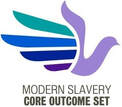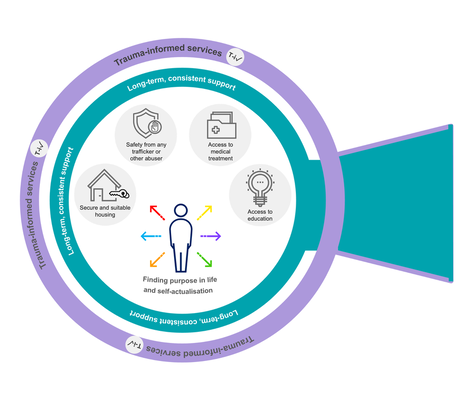AIMS
This study conducted qualitative interviews with survivors to address gaps identified through our literature reviews and secondary analysis of pre-existing and anonymized transcripts. Recruitment and sampling will focus on groups that are identified as underrepresented in previous work, as indicated by the literature reviews and secondary analyses. Early results from the reviews and aggregate demographics of the pre-existing transcripts suggest that this is likely to include UK, Albanian, Eritrean, and Vietnamese nationals; men, survivors of labour exploitation for criminal activity; and individuals who do not access formal government-funded support for survivors of modern slavery.
METHODS
One-to-one semi-structured interviews with adult survivors of modern slavery who are being supported (e.g., with mental health, employment, any immigration issues) by a UK-based charity (e.g., the Helen Bamber Foundation, Survivor Alliance). Questions ask about important recovery outcomes or milestones, key recovery achievements and desires, differences between what participants and charities think are important recovery outcomes, and critical outcomes services for modern slavery survivors should aim for. The interview will follow a trauma-informed approach (Buffalo 2020), adopting principles around safety (e.g., that the physical interview room environment is welcoming), trustworthiness (e.g., that the interview is conducted with respect and clarity), and affirmation (e.g., people feel that their experiences have been validated).
RESULTS
Supplementary interviews with underrepresented groups added nuance to previously documented outcomes and drew the links between different domain areas. For example, they illustrated the intimate link between safety and housing, revealing serious incidents of violence and continued abuse in managed/provider accommodation. Interviews demonstrated that, for many survivors, safe houses were not safe. Moreover, as interviews were conducted by a peer-researcher, the conversation was much more candid, and the outcomes spoken about much more critical of third parties. For instance, interviewees described NGO staff who were: not acquainted with trauma-informed care and caused harm by comparing people’s cases; got angry with requests they could not fulfil; and, were unfamiliar with modern slavery and human trafficking services, rights, and entitlements.
MSCOS Discussion Forums
|
PARTNERS
|
FUNDER
|















